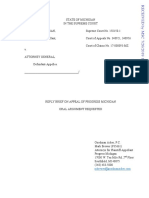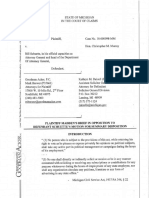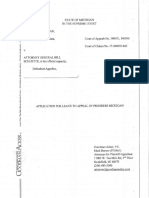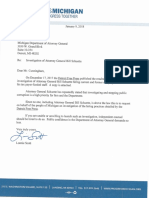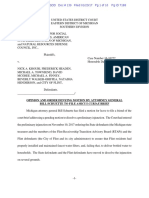Professional Documents
Culture Documents
LDFA Rejection
Uploaded by
progressmichigan0 ratings0% found this document useful (0 votes)
427 views2 pagesSecretary of State Ruth Johnson rejects Progress Michigan complaint regarding Snyder’s legal defense.
Copyright
© © All Rights Reserved
Available Formats
PDF or read online from Scribd
Share this document
Did you find this document useful?
Is this content inappropriate?
Report this DocumentSecretary of State Ruth Johnson rejects Progress Michigan complaint regarding Snyder’s legal defense.
Copyright:
© All Rights Reserved
Available Formats
Download as PDF or read online from Scribd
0 ratings0% found this document useful (0 votes)
427 views2 pagesLDFA Rejection
Uploaded by
progressmichiganSecretary of State Ruth Johnson rejects Progress Michigan complaint regarding Snyder’s legal defense.
Copyright:
© All Rights Reserved
Available Formats
Download as PDF or read online from Scribd
You are on page 1of 2
Stare oF MicuiGan
RUTH JoHNSON, SECRETARY OF STATE
DEPARTMENT OF STATE
Lansing
April 1, 2016
Lonnie Scott
215 South Washington Square #100
Lansing, Michigan 48933
Dear Mr. Scott:
The Department of State (Department) acknowledges receipt your correspondence regarding
Governor Rick Snyder, alleging that he failed to establish a legal defense fund in violation of the
Legal Defense Fund Act (LDFA), 2008 PA 208, MCL 15.521 ef seq.
Under the LDFA, an elected official is prohibited from soliciting or accepting contributions
made “for the purpose of defending the elected official in a criminal, civil, or administrative
action that arises directly out of the conduct of the elected official’s governmental duties unless
the contribution is included in a legal defense fund that complies with the requirements of this
act.” MCL 15.533(1). A legal defense fund is required to disclose certain “information about
each person from whom a contribution is received” when filing quarterly transaction reports.
MCL 15.527(1)(b) (emphasis added). The LDFA defines “person” to include “a business,
individual, proprietorship, firm, partnership, joint venture, syndicate, business trust, labor
organization, company, corporation, association, committee, or any other organization or group
of persons acting jointly.” MCL 15.523(f)
You wrote that Governor Snyder allegedly was required to establish a legal defense fund to pay
legal fees incurred in relation to “two (2) contracts to provide legal defense for him personally,
not the State of Michigan, in connection with the Flint water crisis.” Before proceeding, the
Department first must determine whether the State of Michigan constitutes a “person” for
purposes of the LDPA.
The Attorney General has explained that under the rules of statutory construction, “person” does
not include the state or a local unit of government unless the law at issue specifically includes
them:
It is a fundamental rule of statutory construction that neither the state, its agencies
nor political subdivisions are within the purview of a statute unless an intention to
include them is clear. The rule, as contained in 82 CJS, Statutes Sec. 317, p 554,
states:
“The government, whether federal or state, and its agencies are not ordinarily to
be considered as within the purview of a statute, however general and
comprehensive the language of the act may be, unless intention to include them is.
BUREAU OF ELECTIONS
RICHARD H. AUSTIN BUILOING * 1ST FLOOR * 430 W. ALLEGAN * LANSING, MICHIGAN 45918,
Www. Michigan.gov/eon * (517) 979-2640
Lonnie Scott
April 1, 2016
Page 2
clearly manifest, as where they are expressly named therein, or included by
necessary implication.”
See Atty Gen Op No 5500 (July 23, 1979).' An example ofa statute where the term “person”
has been defined to specifically include the state and local units of government is the Lobbyist
Disclosure Act, 1978 PA 472, which provides:
‘Person’ means a business, individual, proprietorship, firm, partnership, joint
venture, syndicate, business trust, labor organization, company, corporation,
association, committee, or any other organization or group of persons acting
jointly, including a state agency or a political subdivision of the state
MCL 4.416(1) (emphasis added). The words “including a state agency or a political subdivision
of the state” plainly are omitted from the statutory definition of “person” under the LDFA.
Therefore, payments made by the State or local units of government for an elected official's legal
defense for actions arising out of the conduct of the official's governmental duties do not
constitute contributions within the meaning of the statute. Governor Snyder is not required to
form a legal defense fund for payments made by the State of Michigan for his legal defense.
Finally, it is important to note that unlike the Lobbyist Disclosure Act and the Michigan
‘Campaign Finance Act, the LDFA does not establish an administrative complaint process. Cf.
MCL 4.424, 169.215,
Sincerely,
‘Melissa Malerman,/Election Law Specialist
Michigan Bureau of Elections
Available at httpy/wver.ag.state.mi,usopinion datafiles/1970s/0p05500,hum. In addition, ina case originating
from Michigan, the U.S. Supreme Court has held that the statutory term “person” does not include state government
for purposes of litigation under 42 USC §1983. IWill v Michigan Dep't of State Police, 491 US 52 (1987),
You might also like
- Progress Michigan FOIA Lawsuit BriefDocument16 pagesProgress Michigan FOIA Lawsuit BriefprogressmichiganNo ratings yet
- Progress Michigan SOS FOIADocument1 pageProgress Michigan SOS FOIAprogressmichiganNo ratings yet
- SPV Letter To MI SoS Ruth JohnsonDocument2 pagesSPV Letter To MI SoS Ruth JohnsonprogressmichiganNo ratings yet
- 2010 2013Document46 pages2010 2013progressmichiganNo ratings yet
- Bill Schuette 11/16/16 Calendar EntryDocument1 pageBill Schuette 11/16/16 Calendar EntryprogressmichiganNo ratings yet
- Madden Brief in Opposition To Motion For Summary DispositionDocument125 pagesMadden Brief in Opposition To Motion For Summary DispositionprogressmichiganNo ratings yet
- Calley City of FlintDocument838 pagesCalley City of FlintprogressmichiganNo ratings yet
- 2016 2018Document80 pages2016 2018progressmichiganNo ratings yet
- 2014Document291 pages2014progressmichiganNo ratings yet
- 2015Document158 pages2015progressmichiganNo ratings yet
- Schuette Political Enterprise EmailsDocument42 pagesSchuette Political Enterprise EmailsprogressmichiganNo ratings yet
- Application For Leave To Appeal of Progress Michigan V SchuetteDocument82 pagesApplication For Leave To Appeal of Progress Michigan V SchuetteprogressmichiganNo ratings yet
- ABC DocumentsDocument5 pagesABC DocumentsprogressmichiganNo ratings yet
- Letters To Auditor General, AG Criminal Division Re: Schuette HiringDocument2 pagesLetters To Auditor General, AG Criminal Division Re: Schuette HiringprogressmichiganNo ratings yet
- Voluntary Financial Disclosure July 12 2018Document64 pagesVoluntary Financial Disclosure July 12 2018progressmichiganNo ratings yet
- FOIA Lawsuit DocumentsDocument69 pagesFOIA Lawsuit DocumentsprogressmichiganNo ratings yet
- Schuette EPA EmailDocument5 pagesSchuette EPA EmailprogressmichiganNo ratings yet
- Progress Michigan Motion To Expedite FOIA LawsuitDocument36 pagesProgress Michigan Motion To Expedite FOIA LawsuitprogressmichiganNo ratings yet
- WCC Event FormDocument2 pagesWCC Event FormprogressmichiganNo ratings yet
- Bill Schuette Campaign Finance ComplaintDocument12 pagesBill Schuette Campaign Finance ComplaintprogressmichiganNo ratings yet
- GHIB Community Benefits LetterDocument2 pagesGHIB Community Benefits LetterprogressmichiganNo ratings yet
- Progress Michigan Hatch Act Complaint - Bill SchuetteDocument10 pagesProgress Michigan Hatch Act Complaint - Bill SchuetteprogressmichiganNo ratings yet
- PTL Campaign Finance ComplaintDocument2 pagesPTL Campaign Finance ComplaintprogressmichiganNo ratings yet
- Michigan Department of Corrections: Mdoc Evidence For Official Use Only. Do NotDocument7 pagesMichigan Department of Corrections: Mdoc Evidence For Official Use Only. Do NotprogressmichiganNo ratings yet
- YAL and Calley SourcesDocument13 pagesYAL and Calley SourcesprogressmichiganNo ratings yet
- School Reform/Redesign Office FOIADocument1 pageSchool Reform/Redesign Office FOIAprogressmichiganNo ratings yet
- Trinity DocumentsDocument13 pagesTrinity DocumentsprogressmichiganNo ratings yet
- 1.23.17 Order Re Motion To File Amicus CuriaeDocument10 pages1.23.17 Order Re Motion To File Amicus CuriaeprogressmichiganNo ratings yet
- GRPS FoiaDocument1 pageGRPS FoiaprogressmichiganNo ratings yet
- Schuette Petition SignaturesDocument3 pagesSchuette Petition SignaturesprogressmichiganNo ratings yet
- The Subtle Art of Not Giving a F*ck: A Counterintuitive Approach to Living a Good LifeFrom EverandThe Subtle Art of Not Giving a F*ck: A Counterintuitive Approach to Living a Good LifeRating: 4 out of 5 stars4/5 (5783)
- The Yellow House: A Memoir (2019 National Book Award Winner)From EverandThe Yellow House: A Memoir (2019 National Book Award Winner)Rating: 4 out of 5 stars4/5 (98)
- Never Split the Difference: Negotiating As If Your Life Depended On ItFrom EverandNever Split the Difference: Negotiating As If Your Life Depended On ItRating: 4.5 out of 5 stars4.5/5 (838)
- Shoe Dog: A Memoir by the Creator of NikeFrom EverandShoe Dog: A Memoir by the Creator of NikeRating: 4.5 out of 5 stars4.5/5 (537)
- The Emperor of All Maladies: A Biography of CancerFrom EverandThe Emperor of All Maladies: A Biography of CancerRating: 4.5 out of 5 stars4.5/5 (271)
- Hidden Figures: The American Dream and the Untold Story of the Black Women Mathematicians Who Helped Win the Space RaceFrom EverandHidden Figures: The American Dream and the Untold Story of the Black Women Mathematicians Who Helped Win the Space RaceRating: 4 out of 5 stars4/5 (890)
- The Little Book of Hygge: Danish Secrets to Happy LivingFrom EverandThe Little Book of Hygge: Danish Secrets to Happy LivingRating: 3.5 out of 5 stars3.5/5 (399)
- Team of Rivals: The Political Genius of Abraham LincolnFrom EverandTeam of Rivals: The Political Genius of Abraham LincolnRating: 4.5 out of 5 stars4.5/5 (234)
- Grit: The Power of Passion and PerseveranceFrom EverandGrit: The Power of Passion and PerseveranceRating: 4 out of 5 stars4/5 (587)
- Devil in the Grove: Thurgood Marshall, the Groveland Boys, and the Dawn of a New AmericaFrom EverandDevil in the Grove: Thurgood Marshall, the Groveland Boys, and the Dawn of a New AmericaRating: 4.5 out of 5 stars4.5/5 (265)
- A Heartbreaking Work Of Staggering Genius: A Memoir Based on a True StoryFrom EverandA Heartbreaking Work Of Staggering Genius: A Memoir Based on a True StoryRating: 3.5 out of 5 stars3.5/5 (231)
- On Fire: The (Burning) Case for a Green New DealFrom EverandOn Fire: The (Burning) Case for a Green New DealRating: 4 out of 5 stars4/5 (72)
- Elon Musk: Tesla, SpaceX, and the Quest for a Fantastic FutureFrom EverandElon Musk: Tesla, SpaceX, and the Quest for a Fantastic FutureRating: 4.5 out of 5 stars4.5/5 (474)
- The Hard Thing About Hard Things: Building a Business When There Are No Easy AnswersFrom EverandThe Hard Thing About Hard Things: Building a Business When There Are No Easy AnswersRating: 4.5 out of 5 stars4.5/5 (344)
- The Unwinding: An Inner History of the New AmericaFrom EverandThe Unwinding: An Inner History of the New AmericaRating: 4 out of 5 stars4/5 (45)
- The World Is Flat 3.0: A Brief History of the Twenty-first CenturyFrom EverandThe World Is Flat 3.0: A Brief History of the Twenty-first CenturyRating: 3.5 out of 5 stars3.5/5 (2219)
- The Gifts of Imperfection: Let Go of Who You Think You're Supposed to Be and Embrace Who You AreFrom EverandThe Gifts of Imperfection: Let Go of Who You Think You're Supposed to Be and Embrace Who You AreRating: 4 out of 5 stars4/5 (1090)
- The Sympathizer: A Novel (Pulitzer Prize for Fiction)From EverandThe Sympathizer: A Novel (Pulitzer Prize for Fiction)Rating: 4.5 out of 5 stars4.5/5 (119)
- Her Body and Other Parties: StoriesFrom EverandHer Body and Other Parties: StoriesRating: 4 out of 5 stars4/5 (821)
